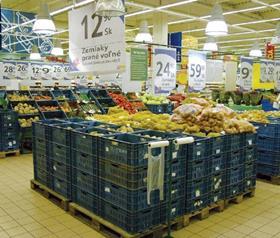
Tesco is to ramp up its own-brand fresh produce offer and consolidate buying of input materials for suppliers, reports the Fresh Produce Journal.
TheUK’s largest supermarket has confirmed it is to step up the amount of space in its stores given to own-brand groceries and fresh produce.
Tescois consolidating the “less meaningful brands to create space for our own brands and the power brands”, according to a presentation by group food sourcing commercial director Matt Simister given to central European suppliers last week.
The move is part of a raft of changes in the retailer’s supply chain planned after it set up its Group Food Sourcing division.
Tescois looking to move from a system where it has “many growers currently supplying many packers whose product is delivered through national distribution networks” to a new model where it is “buying more from the best growers in the world, supplying better invested packers, serving regional distribution networks”.
Within the presentation, Simister and Chris Holmes, commercial director for central Europe general merchandise, described how Tesco plans to develop efficient supply chains by regional consolidation of import supply chains and consolidating volumes at source, consolidation of service providers and packers, and scale buying on supplier packaging and input materials.
Asource said: “Tesco is looking at a lot of things abroad in Asia aroundthe production of packaging. If it standardises things like cardboard which has gone up in price, by getting it in bulk from China and then distributing to suppliers of various types of produce it would be a massive cost saving. It will create uniformity across the supply chain and ultimately will bring down the price of the product. I doubt the savings will completely go back to growers but they may get a little bitmore.
“Global sourcing is a huge plan which they are just starting to implement and it’s really going to come to fruition in the next two to three years. Growers like it because they like to just grow and hate marketing. It’s going to hit packers, suppliers and middlemen hard and the best model for them is to set up a joint venture.”



